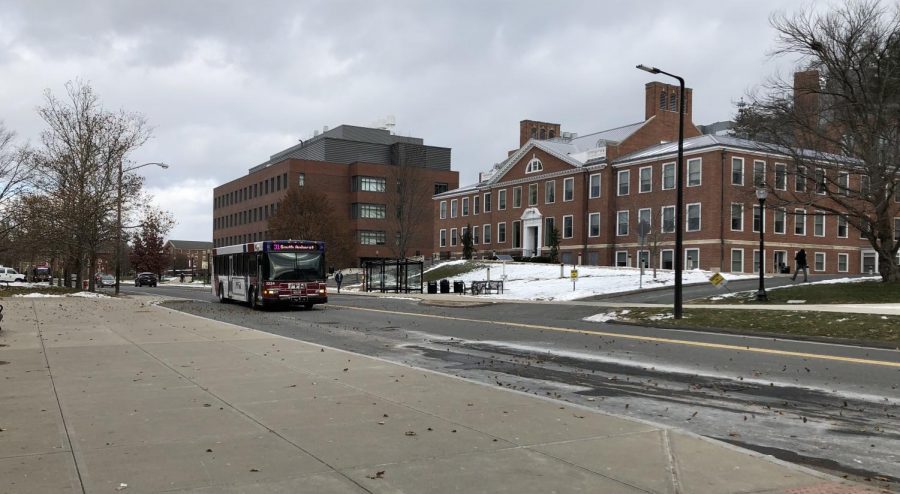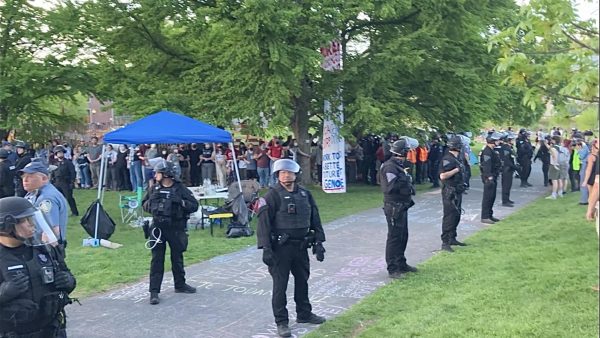The opioid epidemic: UMass faculty and students strive to educate the community
AMHERST – As the opioid epidemic continues to take the lives of more than an average of five Massachusetts residents per day, some faculty and staff at the University of Massachusetts Amherst work to educate students who will be on the front line of fighting the crisis.
“It’s a public health epidemic right now. It is a problem that has no boundaries,” said Clinical Assistant Professor Kim Dion of the College of Nursing. “Addiction does not care how well-off you are, or the color of your skin, or the language you speak … it does not matter.”
In the schools of nursing and public health, professors with backgrounds in substance abuse research and treatment are providing classroom opportunities for students to learn about the current state of the issue and how to combat it in their future careers.
In 2016, UMass was one of 12 schools in the nation to receive a grant from the Substance Abuse and Mental Health Services Administration for a program to teach nursing students how to properly screen and treat patients for substance abuse.
“Last September was the end of our first full year, and we trained 155 students in how to screen and do brief motivational interviews for people with alcohol and substance risk,” said Donna Zucker, the associate dean of academic affairs in the College of Nursing. They got to do that in their coursework and they got to go out and do that in the community, so that was awesome.”
The program is called “Screening, Brief Intervention, and Referral to Treatment,” or SBIRT. Zucker is one of the eight faculty members on the grant and has a background in substance abuse research.
“I also teach a freshman seminar, so every year I do it on drugs,” Zucker said. “This year I’m using the class as a research study, so I got permission from the university’s Institutional Review Board to run a pilot study testing a criminal justice health curriculum in the seminar.”
The seminar is open to any freshman and attracts students from a wide range of majors, according to Zucker.
“I hope that what they get out of it is to de-stigmatize drug use, to understand about mass incarceration, to appreciate that addiction is a disease and not something you have control over,” said Zucker. “If they walk away with those elements and appreciate how tough addiction really is to overcome, then I think that will take them a long way in their lives.”
Professor of Public Health Liz Evans is new to UMass this year and previously worked at the University of California, Los Angeles, doing research projects around addiction for the past 18 years.
She brought with her a study analyzing chronic pain among veterans and the effectiveness of alternative treatments to opioids, such as yoga, tai chi and chiropractic care.
“This semester I am teaching substance abuse and public health, so taking a public health approach to understand substance abuse. I’m hoping I can generate more interest around the topic and that’s what excites me about being here,” said Evans. “Maybe I can be a person who raises awareness about the topic.”
Evans is concerned with the ways in which changes can be made to fight the epidemic, as well as saving the lives of individuals. “Right now we are definitely focused on saving lives, but at the same time, maybe we need to think about the underlying factors, like the reason people have this problem.”
Professor Dion has been researching and working with substance abuse for more than 18 years with a focus on people who are actively using or who are in need of treatment.
Dion places students in local organizations and healthcare facilities for their clinical experience. Students work with the Soldier On homeless shelter at the Northampton Veterans Affairs Medical Center, Tapestry Syringe Access Program in Northampton, addiction treatment and rehabilitation center CleanSlate in Northampton as well as others.
“We are giving students opportunities to engage with caring for people who are substance users, so that’s an important piece because it helps them in their nursing career,” Dion said.
Dion makes sure to tell students that she is someone they can turn to for information and resources if they want to. “I’ve had a number of students who have reached out to me because their sibling is using, their parent is using, their partner is using,” she said.
Dion is active in community task forces and goes beyond teaching her own students about harm reduction and life-saving techniques, including training in the use of intranasal naloxone, also known as Narcan, to revive overdose victims.
“Separate from my job, just as part of my passion for what I do, I go into every unlicensed nursing student’s classroom and I do a [intranasal naloxone] training and I talk to them about my research,” Dion said.
Dion’s research includes interviews with people who inject drugs about the care they received from nurses and what their experiences were like.
“I go in and I share some of that, I talk about the stigma and I talk about intranasal naloxone. I’ve done that for the last two years, so I’ve trained over 500 nursing students,” said Dion.
Intranasal naloxone is a nasal spray that is an “opioid antagonist indicated for the emergency treatment of known or suspected opioid overdose,” according to the FDA.
Resources at UMass
Dion stressed the importance and accessibility of intranasal naloxone on our campus and in the community.
“Any student on campus can go to University Health Services and get intranasal naloxone … you do not need a prescription, you can just go up and get it. That’s important for the students and faculty to know,” Dion said. “Whether it’s for their personal life, or if they want to have it on hand in case … I think that’s something UMass as a whole could identify — that you all have access to it.”
Students also have access to treatment options at UHS. There are currently two licensed providers on campus that can provide students with medication-assisted treatment for substance use disorder, Maria Gallo and Leora Cohen-McKeon.
“I prescribe Suboxone for opioid dependence and I also prescribe another medication called Vivitrol,” Dr. Gallo said. These medications are designed to curb opioid cravings, and when combined with work in a therapeutic setting, have shown to be a successful combination for treatment, according to Gallo.
Gallo and Cohen-McKeon work with the Center for Health Promotion and the Center for Counseling and Psychological Health to guide students who need help through the best path for treatment for them.
“I believe our mission on campus is to provide healthcare for the student body so they can do best what they are doing here, which is to go to school. It’s really hard for people with substance use disorders to be successful in school in the long term,” said Gallo about the small population of students she treats.
While these faculty and staff members are providing an education about substance use disorders and resources for students, they agreed that more could be done on campus to address this nation-wide issue.
“We have little pieces, but nothing really large,” said Dion.
“I think that you do see starts and stops of excitement about it, but there’s no compelling long-range focus and I think that is true about most substance abuse issues in general,” said Zucker. “It’s kind of like we are excited about being ashamed of it. So we just keep pushing the envelope … this is not only just a public health priority, it’s a human rights priority.”
For more information about campus resources, visit the BASICS information page or the Collegiate Recovery information page.
Email Julie at [email protected], or follow her on Twitter @juliemh126.










